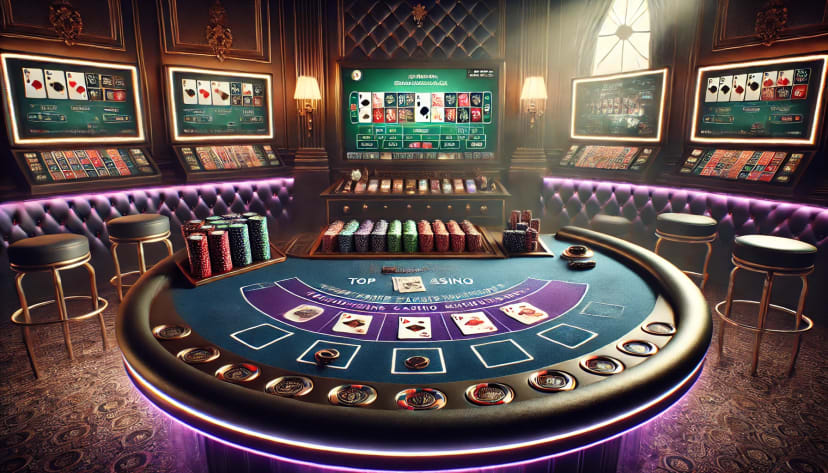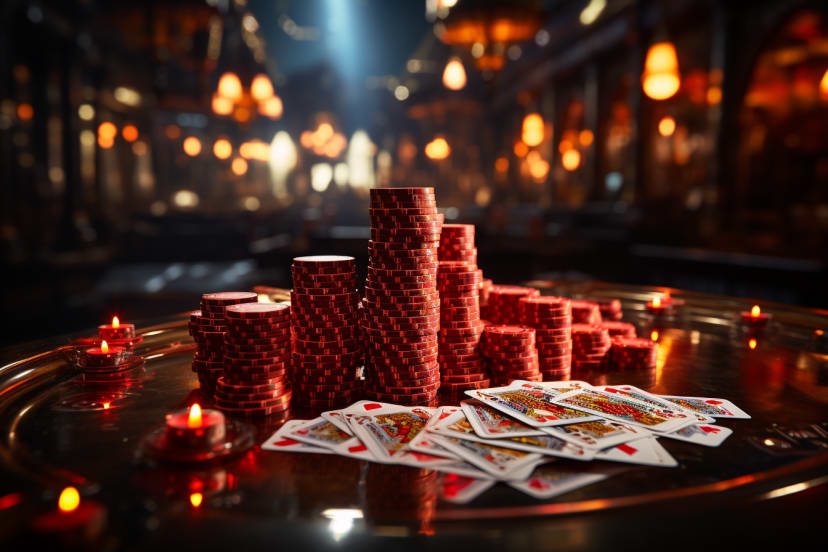Mastering the Double Down in Blackjack: A Strategic Guide

Blackjack, renowned as a classic in the realm of card games, stands as a staple in casinos worldwide, captivating players both on physical tables and online platforms. This game, unique in its combination of skill and luck, invites players to strategically aim for the magic number of 21 without exceeding it, a challenge that sets it apart from games of pure chance. Among the skill-based casino games, blackjack, alongside poker, stands out for its depth and strategic intricacies. For enthusiasts and aspiring professionals, mastering techniques like doubling down is not just a skill—it's an essential part of the game's fabric. To guide you through this journey, we delve deep into the art of doubling down, offering insights and strategies to turn the odds in your favor. And for those ready to put theory into practice, we invite you to explore our top picks at CasinoRank, where the best gaming experiences await. So, take this opportunity to step into the world of blackjack, refine your skills, and discover the exhilarating world of strategic casino gaming!
What is Double Down in Blackjack?
Doubling down in blackjack is an exhilarating and strategic move, where players, sensing a moment of opportunity, decide to double their initial bet on an active hand. This bold decision grants you one additional card, after which you must stand, regardless of the outcome. This move, while embodying the essence of high-risk, high-reward gameplay, introduces a new layer of tactical depth to blackjack. The decision to double down can be a game-changer, potentially doubling your winnings, but it also comes with the risk of losing your increased bet if dealt a low card. It's this balance of risk and potential reward that makes doubling down a thrilling part of blackjack strategy, challenging players to make calculated decisions based on their current hand and the dealer's visible card.
The Perfect Timing for Doubling Down
Identifying the optimal moment to double down in blackjack is akin to a high-stakes balancing act. It involves a nuanced understanding of both your own hand and the dealer's potential outcomes. This section aims to demystify the process, shedding light on when doubling down can swing the game in your favor. It's not just about taking risks; it's about taking smart, calculated risks. By knowing when to double down, you can turn an average game into a winning one, maximizing your potential payout while keeping the risks in check. So, stay tuned as we explore the scenarios where doubling down can be your best move, elevating your gameplay to new heights.
When to Double Down
In the world of blackjack, the decision to double down is only available after your initial two cards have been dealt. There are certain key situations where doubling down is particularly advantageous, turning an ordinary hand into a potentially winning one. Let's explore these scenarios:
Situation #1: Card Total of 11
Having a hand total of 11 is one of the most promising positions for a double down. In this scenario, the odds are in your favor to draw a card that will bring you tantalizingly close to 21. Whether you hit the jackpot with a blackjack, or land a strong hand like 20, 19, or 18, the chances of winning the hand increase significantly. It's a golden opportunity where the risk of busting is minimal, and the potential for a big win is at its peak. Therefore, whenever you find yourself holding a total of 11, seize the moment and consider doubling down to maximize your winnings.
Situation #2: Soft 18, 17, or 16
Soft hands in blackjack—those comprising an Ace and another card—present unique strategic opportunities. An Ace's value flexibility (counting as either 1 or 11) makes these hands particularly valuable. When you're dealt a soft 16, 17, or 18, doubling down can be a smart move, especially if the dealer's face-up card is on the lower side (2 to 6). In these situations, the dealer is more likely to bust, while you have the cushion of the Ace to adjust your total safely. However, it's important to be strategic and not rush into doubling down; assess the dealer's card and your own hand's potential before making your move.
Situation #3: Hard 10 or 9
In contrast to soft hands, hard hands in blackjack do not include an Ace, or the Ace is valued only as 1, removing the flexibility of adjusting the hand's total. When you're holding a hard 9 or 10, the opportunity to double down becomes appealing. This move is most effective when the dealer's face-up card is between 2 and 6. In these cases, the dealer is under pressure to hit in order to reach the standard 17, increasing their chances of busting. So, if your hand is a hard 9 or 10, and the dealer's card is favorable, doubling down can be a savvy way to increase your winnings.
When to Avoid Doubling Down
Doubling down, while a powerful tool, is not always advisable. Recognizing situations where this strategy could backfire is crucial:
Situation #1: Dealer Shows an Ace
If the dealer's face-up card is an Ace, the odds of them hitting a blackjack or a strong hand increase significantly. In such scenarios, doubling down can be a risky gamble, potentially leading to a substantial loss. The dealer's Ace is a strong indicator of their potential hand strength, so exercising caution and holding back from doubling down is often the wiser choice.
Situation #2: Hand Total Exceeds 11
Holding a hand with a total exceeding 11 brings a heightened risk of busting if you choose to double down. The excitement and pace of the game can sometimes overshadow this risk, leading players to make hasty decisions. Instead of doubling down in these situations, it's often better to opt for a hit, aiming to improve your hand while hoping for the dealer to bust. Remember, blackjack is full of unexpected twists, and a conservative approach in these instances can sometimes lead to surprising victories.
Can One Double Down After Hitting or Splitting?
Exploring other common strategies in blackjack, like hitting (drawing additional cards) or splitting (separating a pair into two hands), raises the question: can these be combined with doubling down? Generally, most casinos restrict players from doubling down after hitting, as it would greatly enhance their advantage over the house. Similarly, doubling down after splitting is often not permitted, maintaining the delicate balance of the game's odds.
Conclusion
Blackjack's appeal lies in its complex and unpredictable nature, and the double-down strategy is a testament to this. By mastering when and how to use this technique, you can gain a significant edge over the dealer. However, it's vital to remember that, despite your best strategies, the house edge always looms. Manage your expectations and focus on enjoying the game. For beginners and those seeking to expand their blackjack knowledge, exploring topics like common mistakes or the 'match the dealer' strategy can be immensely beneficial. Embark on your blackjack adventure at one of CasinoRank's recommended casinos, where learning and excitement converge, offering you a world of strategic gaming and potential wins.
FAQ
Does Doubling Down Affect the House Edge in Blackjack?
Doubling down, when used strategically, can actually improve your odds in Blackjack. If you choose the right moments, such as when you have a total of 11 or a soft hand against a weak dealer card, you can increase your chances of winning. Executing this move correctly can shift the odds slightly in your favour, reducing the overall house edge. Remember to gamble responsibly.
Can I Double Down on Any Hand in Blackjack?
In Blackjack, doubling down is generally allowed only on your initial two cards. However, some casinos may have specific rules regarding which hands you can double down on. For instance, some casinos might not permit doubling down on hands resulting from splitting pairs. Always familiarise yourself with the specific house rules of the casino where you're playing. Remember to gamble responsibly.
How Do I Signal to the Dealer That I Want to Double Down?
In a brick-and-mortar casino, the standard way to signal that you want to double down is by placing an additional bet equal to your original wager next to your initial bet. You can also verbally announce your intention to double down. Clear communication is key to avoid any misunderstandings with the dealer. Remember to gamble responsibly.
Is Doubling Down Advisable in Online Blackjack?
Yes, doubling down is also a viable strategy in online Blackjack. The rules and optimal situations for doubling down remain the same as in land-based casinos. However, as online platforms can differ, it's always a good idea to review the specific rules of the game you're playing. Online Blackjack may also offer unique features or variations, so understanding the game's dynamics is crucial. Remember to gamble responsibly.
What Happens If I Double Down and the Dealer Gets Blackjack?
If you double down and the dealer gets Blackjack, you will lose double your original bet. This highlights the risk involved in doubling down, particularly if the dealer's upcard is an Ace or a ten-value card. This scenario underscores the importance of carefully assessing the dealer's card before deciding to double down. Remember to gamble responsibly.















